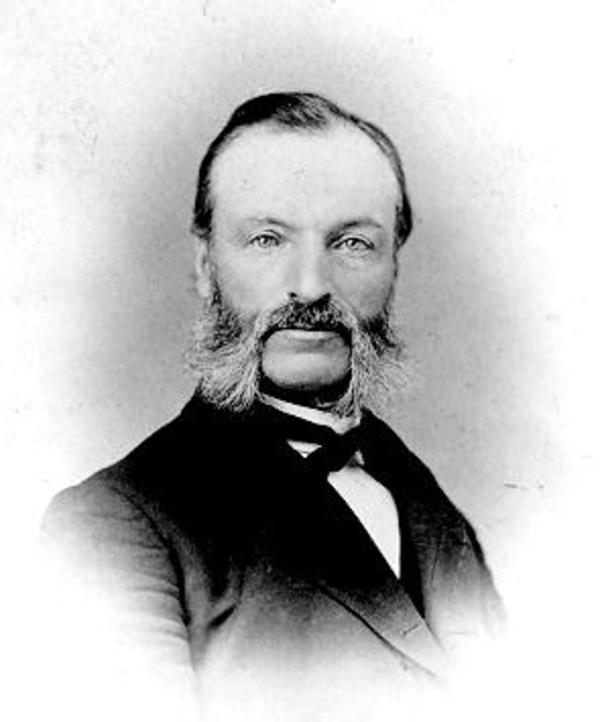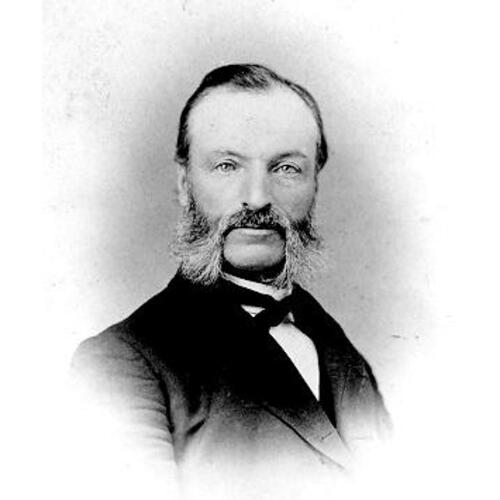
Source: Courtesy of Wikimedia Commons
ARSENAULT, JOSEPH-OCTAVE, teacher, businessman, politician, and farmer; b. 5 Aug. 1828 in Cascumpec, P.E.I., son of Mélème Arsenault, a farmer, and Bibienne Poirier; m. 15 April 1861 Gertrude Gaudet at Miscouche, P.E.I., and they had five sons and four daughters; d. 14 Dec. 1897 in Abrams Village, P.E.I.
Joseph-Octave Arsenault was four years old when his parents moved from Cascumpec to La Roche (Egmont Bay). At first he went to the local school and later, at Miscouche, he attended one run by Joseph-F. Gaudet, considered by the inspector of schools to be the best Acadian teacher then working. At age 19 he began his own teaching career, which lasted 18 years. After five years in class he went to the Central Academy in Charlottetown for a year of studies to obtain his first-class teaching certificate.
In 1865 Arsenault left education to go into business. He opened a general store at Abrams Village, where he had taught for many years. In 1874, after the railway had been constructed on the Island, he opened a second store near Wellington, and it became his commercial base. His establishment offered a wide variety of goods which he sold or bartered for farm produce.
During the 1870s Arsenault also took an interest in the fishing industry. He bought a fishery, concentrating at first on mackerel, which was then the most commercially profitable species. But around 1880, when the Island’s lobster industry began to expand rapidly, he entered that business and built a plant at Cape Egmont, becoming one of the leading packers in the region. His product acquired a good reputation and in 1891, at an international exhibition in Jamaica, Arsenault won the gold medal for his canned lobster.
Encouraged by some of his fellow citizens, Arsenault decided in 1867 to follow the example of another Acadian Islander, Stanislaus Francis Perry, and go into politics under the Liberal banner of George Coles*. He was elected to the House of Assembly for Prince County, 3rd District, and held his seat continuously until 1895. During his first campaign he took a stand against the Island’s entry into confederation, maintaining that Islanders could govern themselves better than Canadians would. However, by the time of the July 1870 election he had begun to look more favourably on the idea, although he declared that he would not impose it on Islanders. Unlike some rather paranoid opponents of confederation, he saw the union of the Island with Canada as “an alliance with a people like ourselves, and not with a foreign country or despotic government.”
Arsenault did not long remain a Liberal. In August 1870, like almost all the Roman Catholic Liberal members of the house, he joined the Conservative opposition under James Colledge Pope* to end the Liberal administration of Robert Poore Haythorne and form a coalition government. The action was a protest against the government’s refusal to give Catholic schools the grants that Peter McIntyre, the bishop of Charlottetown, had demanded. The Conservatives, for their part, had declared themselves in favour of such subsidies and, since the Liberals continued to oppose the financing of denominational schools, Arsenault remained loyal to the Conservative party for the rest of his life.
Arsenault was appointed to the Executive Council by Pope and sat on it from 25 July 1873 to 4 Sept. 1876 and again from 11 March 1879 to 21 April 1891, under the governments of William Wilfred Sullivan* and Neil McLeod*. He was a member of the Board of Education from 1879 to 1891. On 18 Feb. 1895 he became the Island’s first Acadian to be named to the Senate, where he replaced George William Howlan*. Although Arsenault did not distinguish himself as a politician, he nevertheless earned the respect of his peers and of the anglophone and francophone press. Two of his sons, Joseph-Félix and Aubin-Edmond*, followed their father into politics. Aubin-Edmond was premier of Prince Edward Island from 1917 to 1919, the first Acadian to hold that office in any Canadian province.
The advancement of the Acadian people was one of Arsenault’s major concerns. He kept in touch with Acadian leaders in New Brunswick, such as Pierre-Amand Landry*, Pascal Poirier*, and Abbé Marcel-François Richard*, and he had a hand in the principal projects of Acadian nationalists. He was one of the Island delegates to the congress of the Société Saint-Jean-Baptiste at Quebec in 1880. There he was appointed to the committee to organize the first national convention of Acadians, which took place at Memramcook, N.B., in 1881. He was also a key organizer of the second convention, held at Miscouche in 1884, at which the Acadian flag and anthem were chosen. That year he became the founding president in his parish of the Société l’Assomption, a patriotic body whose main function was to hold celebrations on the feast of the Assumption, the Acadian national holiday.
Arsenault took a particular interest in the development of education among his people and in French-language instruction in Acadian schools. In 1868 he obtained the assembly’s approval for a £5 bonus to be paid to any teacher considered competent to teach French. In 1880 he used his influence to have more French introduced into Acadian schools by encouraging the Board of Education to authorize a new series of French-language readers. Arsenault was also a friend of St Dunstan’s College, Charlottetown, the College of St Joseph at Memramcook, and St Joseph’s Convent at Miscouche. All his children studied in at least one of these institutions.
Promoting agriculture and encouraging new farming settlements were the favourite themes of Acadian nationalism and Arsenault championed them enthusiastically throughout his career. The up-to-date agricultural methods he practised on his own property made him a model farmer. Faced with the problems of overpopulation in Acadian parishes and a dearth of agricultural land, with the help of Abbé Richard he encouraged Acadians to settle on unoccupied land in New Brunswick and Quebec. At the Acadian national convention in 1881 Arsenault was elected second vice-president of the colonization society set up on that occasion.
Joseph-Octave Arsenault was a man of action who participated in almost all of his community’s endeavours and who always enjoyed the respect and esteem of his fellow citizens. He was an outstanding figure in the period usually referred to as the Acadian renaissance. He had a better-than-average education for an Acadian of the time and was among the few educated Acadian leaders who sought to draw their compatriots out of their cultural isolation and their social and economic inferiority and to set them on an equal footing with their fellow citizens of British origin. When he died, Le Moniteur acadien pointed out that he was one of those who had “restored the worth of the French name in the Island province.”
PAPEI, RG 10, 5. P.E.I., House of Assembly, Journal, 1847–95. Courrier des Provinces maritimes (Bathurst, N.-B.), 23 févr. 1895. L’Impartial (Tignish, Î.-P.-É.), 28 févr. 1895. Islander, 25 March 1870. Le Moniteur acadien (Shédiac, N.-B.), 26 juin, 25 sept. 1884; 6 août 1886; 17, 21 déc. 1897. Prince Edward Island Agriculturist (Summerside), 22 June 1891. Summerside Journal, 21 Feb. 1867. CPC, 1887: 358–59, 364; 1897. Georges Arsenault, Les Acadiens de l’Île, 1720–1980 (Moncton, N.-B., s.d.). J.-H. Blanchard, The Acadians of Prince Edward Island, 1720–1964 (Charlottetown, 1964); Acadiens de l’Île-du-Prince-Édouard ([Charlottetown], 1956). By the old mill stream: history of Wellington, 1833–1983, ed. Allan and Mary Graham ([Wellington, P.E.I.], 1983). Conventions nationales des Acadiens, Recueil des travaux et délibérations des six premières conventions, F.-J. Robidoux, compil. (Shédiac, 1907). Georges Arsenault, “Le dilemme des Acadiens de l’Île-du-Prince-Édouard au 19e siècle,” Acadiensis (Fredericton), 14 (1984–85), no.2: 29–45.
Cite This Article
Georges Arsenault, “ARSENAULT, JOSEPH-OCTAVE (1828-97),” in Dictionary of Canadian Biography, vol. 12, University of Toronto/Université Laval, 2003–, accessed February 27, 2026, https://www.biographi.ca/en/bio/arsenault_joseph_octave_1828_97_12E.html.
The citation above shows the format for footnotes and endnotes according to the Chicago manual of style (16th edition). Information to be used in other citation formats:
| Permalink: | https://www.biographi.ca/en/bio/arsenault_joseph_octave_1828_97_12E.html |
| Author of Article: | Georges Arsenault |
| Title of Article: | ARSENAULT, JOSEPH-OCTAVE (1828-97) |
| Publication Name: | Dictionary of Canadian Biography, vol. 12 |
| Publisher: | University of Toronto/Université Laval |
| Year of publication: | 1990 |
| Year of revision: | 1990 |
| Access Date: | February 27, 2026 |



